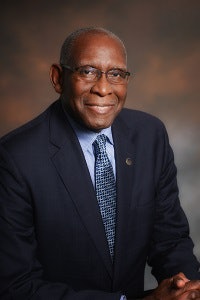U.S. Virgin Islands Gov. Kenneth Mapp has signed legislation that requires college tuition be free for U.S. Virgin Islands students who plan on attending the University of the Virgin Islands.
This new program marks the University of the Virgin Islands as the first historically Black college and university to provide free tuition to students residing in its state/territory, according to The Virgin Islands Consortium.
The bill will use $3 million from the Internal Revenue Matching Fund to the University of the Virgin Islands Scholarship Revolving Fund to keep the free tuition program functioning.
“Many of our talented graduates from our high schools leave the Territory and borrow huge sums of student loan money to attend college. Often times these students do not complete their education because of a lack of financial resources even though they have already borrowed a good deal of money,” Mapp wrote to Senate president Myron D. Jackson. “By approving this measure, it is the first scholarship program of any Territory of the United States, following the lead of only two other states that provide tuition-free Bachelor’s degrees.”
This new law and the opportunities that it will create, is likely to be a positive ‘game changer’ for many families, the governor added.
 Dr. David Hall
Dr. David HallDr. David Hall, president of the University of the Virgin Islands said that the legislation will help more Virgin Islanders to obtain access to higher education.
“It is a historic move, we’re one of few jurisdictions that have developed this type of policy for four year degrees. The university has been advocating for this type of policy very intensely for the last six months, so it was very exciting to see it come into existence as we start 2019,” Hall added.
The university has advocated for free college because administrators believe it will increase student enrollment, Hall said.
“I hope that this will one, encourage some individuals who were not thinking about going to college, to come because they now know that they can do it without having to incur debt, especially if they’re not living on campus,” Hall said.
Free college has been a reoccurring topic of discussion among higher education scholars, administrators, politicians and citizens for the past several years.
Dr. Marybeth Gasman, the Judy & Howard Berkowitz Professor of Education at the University of Pennsylvania and director of the Penn Center for Minority Serving Institutions, said the legislation is “an exciting development for an HBCU” and that it’s “wonderful” that Virgin Islands residents will have now have access to a college education.
“Given the socio-economic status of many students in the U.S. Virgin Islands, this policy will help to change their lives and the lives of their children,” Gasman said. “Access to college changes lives and can change generations.”
It will be interesting to see what the long-term outcomes, from enrollment to graduation rates, will be from this initiative and legislation, said Dr. Felecia Commodore, assistant professor of educational foundations & leadership at Old Dominion University.
“I think an important piece here is that there is $3 million that the bill is to secure from the Internal Revenue Matching Fund to keep the program operational,” she said. “This indicates that an initiative like this cannot occur without governmental funding. What occurs if the financial state changes or legislatures become more fiscally conservative? How will the school plan to adjust if necessary?”
The free-tuition program is scheduled to begin in the fall 2019 semester.
Monica Levitan can be reached at [email protected]. You can follow her on Twitter @monlevy_.















